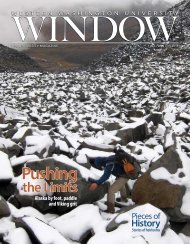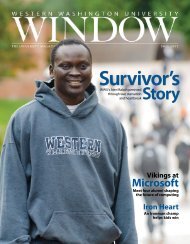WINDOW
Gratitude - WINDOW - The magazine for WWU
Gratitude - WINDOW - The magazine for WWU
- No tags were found...
Create successful ePaper yourself
Turn your PDF publications into a flip-book with our unique Google optimized e-Paper software.
More soldiers are<br />
coming home<br />
– with tougher injuries<br />
The Army has improved treatment<br />
of the wounded so much that it is saving<br />
a record number of lives – 90 percent<br />
of those injured in Iraq and Afghanistan<br />
survive, up from 76 percent in the Vietnam<br />
War. But some of those survivors<br />
face a complicated recovery.<br />
“It has become a lot more complex to<br />
address all those issues in one patient,”<br />
says Lt. Col. Kerrie Golden, who worked<br />
with many wounded soldiers as chief<br />
physical therapist at Walter Reed Army<br />
Medical Center.<br />
But with some patients, they’ve<br />
proved great things are possible. A boom<br />
in prosthetic technology has increased<br />
the scope of recovery for amputees.<br />
“We’re able to push the things that<br />
can be done,” Golden says.<br />
But many of the wounded soldiers<br />
had multiple injuries, so that therapists<br />
had to make sure the work they did with<br />
one part of the body wouldn’t aggravate<br />
other injuries. Some patients had traumatic<br />
brain injuries, making it difficult<br />
for them to remember instructions or<br />
focus on their regimens. And some had<br />
survived injuries so severe they would<br />
never have survived in previous wars.<br />
Operating beyond what’s taught<br />
in textbooks, therapists relied on each<br />
other more than ever, Golden says. They<br />
talked to each other and to other members<br />
of the therapy teams, trying to gain<br />
insights on how to collaborate to provide<br />
the best treatment for each patient.<br />
“It takes a lot of learning and adaptation,”<br />
she says<br />
On duty: Lt. Col. Kerrie Golden (‘89) is Chief<br />
of the Department of Physical Medicine and<br />
Rehabilitation at Madigan Army Medical Center.<br />
26 <strong>WINDOW</strong> • Fall 2010 • Western Washington University<br />
Continued from page 25.<br />
When it came time to apply for graduate schools, it was<br />
Knutzen who suggested the U.S. Army-Baylor University’s<br />
physical therapy program. Attracted to the idea of completing<br />
her master’s degree without debt and with a job, she signed up.<br />
Life with the Army has meant moving around the country.<br />
She met her husband, Col. Robert Taradash, in Alabama. Both<br />
were later stationed in Alaska and married in 1994. They had<br />
their first daughter, Aubrey, in Texas in 2000, and a son, Levi, in<br />
2005. She got a Doctor of Physical Therapy degree from Temple<br />
University in 2006.<br />
Then in August 2008, she got her biggest assignment yet:<br />
Integrated Physical Therapy Services Chief at Walter Reed<br />
Army Medical Center and National Naval Medical Center.<br />
Golden was in charge of helping to integrate the Army and<br />
Navy’s large rehabilitation teams as the two medical centers<br />
merged. Even within Walter Reed, groups of therapists were<br />
separated from each other due to limited space. As a result, they<br />
rarely collaborated. “My proudest accomplishment was bringing<br />
them together to work more as a team,” she says.<br />
Given that Golden was the top administrator, much of her<br />
work was behind the scenes to maintain the Walter Reed physical<br />
therapy unit’s reputation as one of the best in the country for<br />
helping soldiers recover from the worst injuries.<br />
“It takes a tremendous amount of work to juggle all of that so<br />
the therapists can take care of the patients well,” she says.<br />
When she arrived at Walter Reed, the center had a well-established<br />
adaptive sports and recreational activities program, including<br />
kayaking, scuba, seated volleyball, wheelchair basketball<br />
and many other activities as part of patients’ recovery plans. Patients<br />
run – or hand-cycle – the Army Ten Miler in Washington,<br />
D.C., or even marathons.<br />
Golden also worked with Disabled Sports USA to put together<br />
teams to compete in the 2009 and 2010 Ski to Sea races in<br />
Bellingham. She served as the Nordic skier on the team, named<br />
“Missing Parts in Action.”<br />
Tears come to her eyes when she talks about watching the<br />
impact of the athletic program on wounded soldiers: “A lot of<br />
the time I feel like they’ve lost so much, and they have,” she says.<br />
“But when they’re out there, they can feel normal again.”<br />
It takes a lot of time and a lot of work, Golden says, but there’s<br />
nothing like seeing the strength and confidence return as soldiers<br />
regain their physical abilities.<br />
“You see these people come in and they’re inpatients and<br />
they’re pretty beat-up looking. Later on in rehab, they’re a little<br />
better,” she says. “It’s really rewarding to take someone from a really<br />
debilitated physical state to a much more independent view<br />
of life.”<br />
Ten months after Golden and her husband adopted their<br />
younger daughter, Rhea, in December 2008, Golden took<br />
her skills closer to the battlefield. From October 2009 to April<br />
2010, she was deployed to Iraq, to run the Physical Therapy Service<br />
in a combat support hospital in Baghdad. The soldiers she<br />
saw usually had the<br />
muscle strains,<br />
sprains and backaches<br />
she was used<br />
to seeing in the<br />
U.S. – but she also<br />
saw Iraqi civilians.<br />
She particularly<br />
remembers<br />
a 13-year-old girl<br />
recovering from<br />
burns from a<br />
kitchen accident.<br />
The girl spoke no<br />
English, but with<br />
the help of translator<br />
Golden had<br />
to gain her trust<br />
and coax her body<br />
In addition to her administrative duties, Lt. Col. Kerrie<br />
Golden also sees patients, including active duty<br />
into motion.<br />
“It was hard to soldiers and veterans, who need physical therapy to<br />
recuperate from injuries. Photos by Aaron Barna<br />
explain the necessity<br />
of doing physical<br />
therapy when it’s so painful,” she says. “In the early stages,<br />
just trying to get her out of bed was very difficult.”<br />
Golden improvised a therapy program with her kids’ old toys<br />
(Mr. Potato Head was a big hit), games and drawing on walls.<br />
“We would do ‘Ring around the Rosie,’ the ‘Hokey Pokey,’<br />
anything to move,” she says.<br />
Golden didn’t give up on the girl in Iraq, and she wouldn’t<br />
give up on Haemmerle, the soldier at Walter Reed who wanted<br />
to repair his body enough to return to his unit in Afghanistan.<br />
Golden set a long course of treatment: bending, stretching<br />
and exercise.<br />
“As the days and weeks went by Lt. Col. Golden increased<br />
my program, she increased my work and what she wanted me to<br />
do,” Haemmerle says. “I did much better than I ever thought I<br />
would.”<br />
After 12 months of physical therapy, plus therapy for concentration<br />
problems, doctors pronounced him fit for duty and he<br />
returned to Afghanistan in January 2010.<br />
“Am I 100 percent? No.” he says. “But who is?”<br />
But he no longer has to wriggle sideways into his body armor.<br />
Golden moved to Madigan Army Medical Center in July<br />
2010 as her husband took over command of the 42nd Military<br />
Police brigade at Joint Base Lewis-McChord. At Madigan,<br />
Golden is just getting started as the Chief of the Department of<br />
Physical Medicine and Rehabilitation. One thing she’d like to do<br />
is have the rehabilitative services collaborate more closely with<br />
the Warrior Transition Brigade’s adaptive sports program to get<br />
recuperating soldiers on the water and on the courts.<br />
Golden closes her emails with this quote from Martin Luther<br />
King Jr.: “You don’t have to see the whole entire staircase, just<br />
take the first step.”<br />
“It just speaks to possibilities,” she says.<br />
www.wwu.edu/window 27








